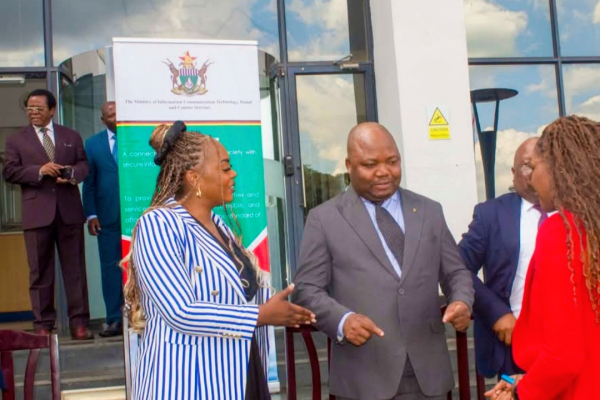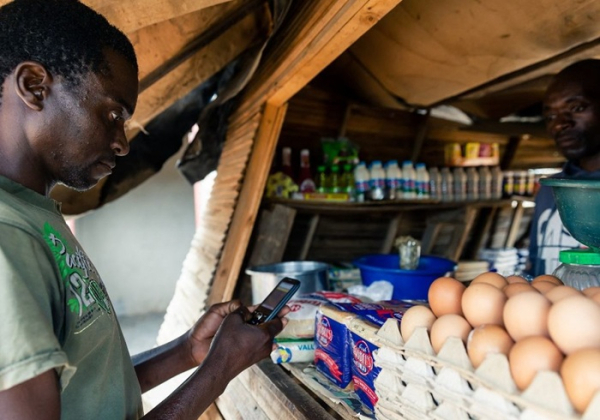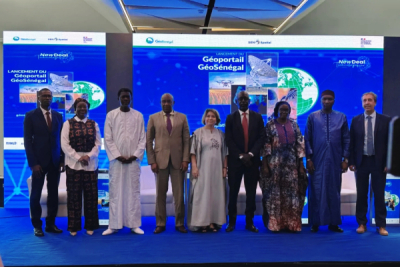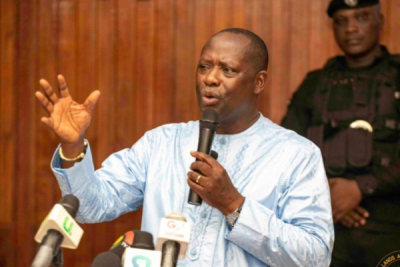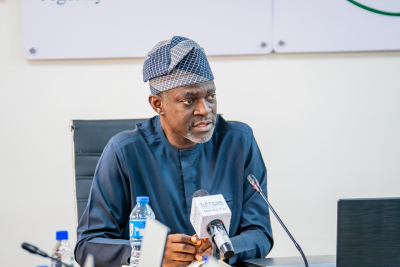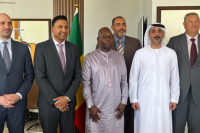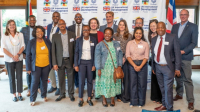- Zimbabwe launches digital skills program with UAE support to train 1.5 million citizens
- The initiative focuses on programming, AI, data science, and Android development in Kotlin
- Part of Zimbabwe's digital transformation strategy through 2030, it aims to address ICT skill gaps
Zimbabwe's government, with support from the United Arab Emirates, launched a program on Thursday, April 10, to train 1.5 million citizens in programming, aiming to establish "the foundations for a future-focused Zimbabwean workforce skilled in cutting-edge technologies."
The "Zimbabwe Digital Skills Program" will equip participants with key competencies, including data science, programming, Android development in Kotlin, and artificial intelligence.
This initiative aligns with the Zimbabwean government's digital transformation strategy through 2030, which prioritizes skills development and digital capacity building as one of its three core pillars. The government identified a shortage of ICT skills and low digital literacy as significant obstacles to the information and communication technology sector.
"Zimbabwe has a high literacy level and should leverage on this to become a software and hardware development hub. The Government of Zimbabwe intends to increase innovation through promoting local content, heritage and culture applications development," according to the government's master plan.
In August 2024, the government established ties with LinkedIn, focusing on digital skills acquisition for civil servants and youth, particularly through the "LinkedIn Learning" platform.
These initiatives aim to address youth unemployment, a pressing issue for the country. According to the World Bank, approximately 61% of Zimbabwe's population is under 25. However, the country faces high levels of unemployment and underemployment, with a youth unemployment rate of 35% in 2021. The World Bank also estimates that nearly 230 million jobs in sub-Saharan Africa will require digital skills by 2030.
By Isaac K. Kassouwi,
Editing by Sèna D. B. de Sodji
To challenge international neobanks, Solimi has launched a mobile app in Togo, emphasizing ease of use, secure transactions, and its established position within the country's financial ecosystem.
Lomé-based fintech Solimi has launched Gnim, a mobile application designed for comprehensive digital management of personal finances and online payments in Togo. Developed by Matina Gaël Egbidi and launched in 2020, Gnim offers users a fully digital account, instant virtual Visa card issuance, and advanced financial tracking tools.
The application features automatic expense categorization, real-time balance checks, dynamic transaction history generation, and secure online and in-store payment services. Users can create an account and manage their finances directly from their smartphones, facilitating online and in-store purchases, transfers, and budget tracking. Gnim is available on iOS and Android, with over 10,000 downloads on the Play Store.
Solimi aims to bolster financial inclusion and reduce Togolese reliance on foreign financial platforms. The app emphasizes a streamlined user experience, an intuitive interface, and compatibility with major payment channels to attract a young, digitally connected demographic.
However, the startup faces a competitive Togolese fintech market, where widespread adoption hinges on user trust, service reliability, and strategic local partnerships. Notably, Gnim competes with established players such as the super app Gozem, MiaPay, and eGo Transfer.
By Adoni Conrad Quenum,
Editing by Feriol Bewa
- Senegal launches National Geoportal to expand access to geospatial data
- Platform supports territorial governance, transparency, and public data accessibility
- Offers geospatial data for sectors including agriculture, environment, infrastructure, and public services
The Senegalese government officially launched the National Geoportal on Tuesday, April 8, in Dakar, aiming to democratize access to geospatial data for improved territorial governance, transparency, innovation, and inclusive public data management.
"Digital transformation is no longer a choice—it is a necessity. Geospatial data must now be accessible in real time, not only to expert communities but also to citizens and entrepreneurs in their daily activities. By fully integrating geospatial data into the digital dynamic, the State is building a more agile, more efficient administration, firmly focused on citizens," said Isidore Diouf, Director General of Sénégal Numérique SA.
The platform was developed under the National Geomatics Plan (PNG) and the SEN Spatial project, with support from technical partners, including the French Embassy. It provides geospatial data across key sectors such as agriculture and food security, the blue economy, basic social services, environment and biodiversity, and infrastructure and spatial planning. The portal also offers information on geomatics activities and training.
This initiative aligns with the Technological New Deal, Senegal's digital strategy, which prioritizes modernizing the public information system. Sénégal Numérique SA, the lead entity in implementing the national digital policy, has deployed its technical infrastructure to ensure the resilience, availability, and security of data on the GeoSenegal platform.
Senegal intends to establish integrated digital governance through this initiative, with territorial data playing a crucial role alongside strategic frameworks like digital identity. This move follows the recent launch of Senegal’s first satellite, GAINDESAT-1A, designed for Earth observation and enhancing territorial management capabilities. The overarching goal is to strengthen inter-institutional coordination and accelerate the digitization of public services.
By Samira Njoya,
Editing by Sèna D. B. de Sodji
Ghana is accelerating its economy-wide digital transformation. In December 2024, the government initiated a review of its education ICT policy to modernize it and address current sector challenges.
Ghana's Minister of Lands and Natural Resources, Emmanuel Armah-Kofi Buah, emphasized the necessity of digitizing land resource management for increased efficiency during an April 8 visit to the Lands Commission. The $165 million initiative seeks to overhaul a system deemed slow, complex, and vulnerable.
"With my interactions with management of the Commission earlier this morning, I was told that 90% of the Commission’s work is manual. The current system is too slow, cumbersome, and vulnerable. And I believe that digitising the system will speed up surveying and mapping processes, help in locating land quickly, reduce paperwork, and ultimately boost government revenue mobilisation efforts," Buah stated.
The Food and Agriculture Organization of the United Nations (FAO) supports this initiative, asserting that responsible digital transformation of land administration systems can yield substantial benefits. It could invigorate land markets, enhance government land-related revenue, and stimulate economic growth through innovation. It would also strengthen transparency and equity among stakeholders, thus mitigating corruption risks.
This land resource digitization aligns with the Ghanaian government's broader objective to leverage digital technologies for economic growth, public service modernization, and equitable access to digital tools. Digitalization projects are also underway in sectors like education.
However, the $165 million funding requirement poses a potential obstacle to the transformation's implementation. "The infrastructure can be largely invisible, taken for granted, or simply not understood by key decision-makers. To be sustainably maintained, LAS demand systematic, unified, and durable digital transformation plans, that align with each country’s priorities," notes the FAO's 2022 report, "Funding digital transformation of land administration."
By Isaac K. Kassouwi,
Editing by Sèna D. B. de Sodji
- Benin approves digital public procurement system to streamline procedures and improve transparency
- System aims to simplify contract awarding, enhance fairness, and reduce opacity in bidding processes
Benin's government approved the implementation of a digital public procurement system in a Council of Ministers meeting on Wednesday, April 9, aiming to streamline procedures, enhance contract awarding efficiency, and ensure greater transparency in public contract allocations. Revised public procurement regulations will support the new system, with relevant ministers tasked to guarantee its effective application.
"Beyond the irrefutable advantages of technological evolution, the digitalization of public procurement will generate significant gains and progress beneficial to both bidders and contracting authorities," the Council of Ministers stated.
The move aligns with Benin's broader digital transformation efforts. Since 2016, over 1,000 public services have been digitized, with 210 fully dematerialized, allowing citizens to complete administrative tasks online. The Ministry of Digital Affairs and Digitalization has allocated 29.03 billion CFA francs (approximately $48.6 million) for 2025, a 19.3% increase from 2024, to support these modernization initiatives. Further sector modernizations are expected in the coming months.
The digital procurement system is projected to strengthen transparency, simplify processes, and mitigate opaque practices. By automating procedures and centralizing data, it will facilitate bidder access to information, ensure equal treatment among candidates, and reduce ambiguity in bid evaluations. This approach may also shorten procurement timelines, improve decision traceability, and generate budgetary savings. Ultimately, it should enhance contracting authority accountability and foster an environment conducive to investment and competitiveness.
By Samira Njoya,
Editing by Sèna D. B. de Sodji
The National Information Technology Development Agency (NITDA) has officially inaugurated the Local Organising Committee (LOC) for the upcoming GITEX Nigeria 2025, marking a key milestone in the country’s tech advancement journey.
The formation of the LOC is a strategic step toward hosting Nigeria’s first-ever edition of GITEX, a globally recognized tech exhibition and conference. The event aims to catalyze innovation, attract investments, and elevate Nigeria’s standing in the global digital economy.
With preparations now underway, GITEX Nigeria 2025 promises to be a landmark platform for showcasing local innovation and connecting Nigeria’s tech ecosystem with global players.
The commitment is significant because it addresses one of Africa’s most persistent challenges: lack of access to affordable and inclusive financial services.
The Agence française de développement (AFD), which advances France’s policy on sustainable investment and international solidarity, has announced an additional €3 million commitment to the Africa Digital Financial Inclusion Facility (ADFI). The move, announced on April 9, aims to accelerate access to financial services for underserved populations across the continent. This brings AFD’s total contribution to ADFI to over €5 million.
“Developing digital financial services is a key pathway to reach financially excluded populations in Africa,” said Audrey Brule-Françoise, Head of AFD’s Financial Systems Division. “This new contribution will help scale up impactful and inclusive solutions.”
The fresh injection of funds will support scalable digital financial solutions that enable access to credit, savings, and other services essential for investment and entrepreneurship—particularly among women, youth, small businesses, and rural communities.
ADFI, managed by the African Development Bank (AfDB), was launched in 2019 as a collaborative effort between AfDB, AFD, the Bill & Melinda Gates Foundation, and the Government of Luxembourg. France’s Ministry for the Economy, Finance and Industrial and Digital Sovereignty, the Women’s Enterprise Finance Initiative (We-Fi), and India’s Ministry of Finance later joined as partners, further strengthening the initiative’s global backing.
Despite progress in mobile money and fintech innovation, close to half of Africa’s adult population remains excluded from digital financial services. World Bank data shows that in Sub-Saharan Africa, account ownership has more than doubled since 2011, reaching 49 percent in 2021-22. Yet, disparities remain stark—ranging from just 6 percent in South Sudan to 91 percent in Mauritius—highlighting the vast potential to expand financial inclusion through the digitalization of payments.
ADFI aims to bridge this gap through investments in digital infrastructure, supportive regulation, and product innovation, with a strong focus on gender inclusion and capacity building.
With over 2,700 projects in 115 countries, AFD continues to play a central role in supporting sustainable development and financial inclusion, reinforcing France’s global commitment to the Sustainable Development Goals.
Hikmatu Bilali
With its stated aim being to streamline Morocco's used car market, the startup is rebuilding the buying and selling process with reliable services tailored to individuals and professionals.
Kifal Auto, a Moroccan startup's e-commerce platform, facilitates the online purchase, sale, and rental of used cars across multiple cities in the country. Founded in 2019 by Nizar Abdallaoui Maane and based in Casablanca, the company was acquired in 2022 by Autochek, a Nigeria-based automotive technology firm expanding into North Africa.
The platform offers comprehensive client support, including mechanical inspections, vehicle valuations, and administrative procedure management. Vehicles undergo a stringent 200-point expert inspection, ensuring they are in sound condition. Users, whether buying or selling, have access to all necessary data to secure favorable transactions.
Kifal Auto operates in numerous Moroccan cities, including Casablanca, Fez, Rabat, Tangier, Agadir, and Marrakech. The platform features a broad selection of car brands, spanning Japanese, German, and American models.
Additionally, the startup provides car rental services, allowing customers to select new vehicles and benefit from flexible contracts ranging from 12 to 60 months, with fixed monthly payments covering all services for streamlined driving.
Kifal also offers financing solutions through partnerships with financial institutions, enabling buyers to make affordable monthly payments. Users can thus purchase vehicles on credit or leverage various financing options.
By Adoni Conrad Quenum,
Editing by Feriol Bewa
Senegal, with backing from the United Arab Emirates, plans to digitize its daaras, the traditional Quranic schools that educate thousands of children nationwide. A meeting held in Dakar on Monday, April 7, between Senegal’s Minister of National Education, Moustapha Mamba Guirassy, and a delegation from Abu Dhabi-based digital education firm Alef Education, advanced this initiative.
"Fruitful discussions laid the groundwork for a strong partnership, with a pilot phase set to begin in October 2025. The objective is clear: to build a digital education model rooted in our cultural and spiritual values, and capable of equipping daaras with 21st-century teaching tools," the Ministry of National Education said in a press release.
This initiative follows President Bassirou Diomaye Faye’s visit to Alef Education’s headquarters in the United Arab Emirates, where he established the foundation for the collaboration. It falls under the government’s "Senegal Daara Digital Transformation" project, which in its initial phase aims to deploy an artificial intelligence-powered personalized learning platform targeting over 10,000 students. The curriculum will include Arabic, mathematics, and Islamic studies.
Daaras are an important component of Senegal’s education system. According to a 2018 survey by the NGO Global Solidarity Initiative (GSI), there are more than 2,000 such schools across the country. This partnership is expected to create new educational opportunities. Alef Education, known for its expertise in educational technologies, is poised to play a central role in this transformation, providing students with modern digital tools while respecting the cultural and spiritual distinctiveness of the daaras.
By Samira Njoya,
Editing by Sèna D. B. de Sodji
Unilever South Africa, the British High Commission, and global professional services organization EY have awarded over R9 million ($455,832.39) in funding to four South African startups tackling plastic waste.
The support, announced by Unilever South Africa on April 7, includes tailored mentorship and business development assistance under the Transform South Africa initiative, which promotes sustainable solutions and community development.
This new cohort joins previous Transform-supported ventures like Oxfam South Africa’s Social Factory, Imagineif, and Loowatt. Together, they form part of a global movement across 17 countries, bringing scalable, inclusive solutions to millions.
More...
Without a centralized system, fraudulent or inactive cooperatives could continue to receive support or partner with banks and donors. A digital registry increases accountability, ensures only verified cooperatives access benefits, and minimizes data manipulation or errors.
The Government of South Sudan, in partnership with the Food and Agriculture Organisation of the United Nations, launched, on Tuesday, April 8, a cooperative e-registry, a digital platform designed to streamline the registration and oversight of cooperatives across the country. The platform aims to enhance transparency, improve data management, and foster better coordination between agricultural cooperatives and government bodies.
At the launch event, Minister of Agriculture and Food Security Hussein Abdelbagi Akol described the initiative as a major shift from manual processes to a more efficient digital system. “The electronic registration is an innovation in the registration of cooperatives to foster, preserve information on cooperatives, and to know the status of the cooperatives at a glance and ensure stronger communication,” he said. He also emphasized the need for individuals to come together in groups to qualify for government support, signaling a push for more structured and organized cooperative efforts.
The platform is expected to enhance nationwide coordination of cooperatives, support youth engagement, and serve as a foundation for more data-driven agricultural development in South Sudan.
Food and Agriculture Organization (FAO) Country Representative Meshak Malo called on young people to embrace the platform and view agriculture as a modern, tech-enabled business opportunity.
For years, cooperatives in South Sudan have operated in a largely informal and fragmented system. There has been no central, reliable database to verify their existence, activities, or impact, Stephen Almadi, Head of the Cooperative Department at the Co-operative Bank of South Sudan noted. This led to duplicate efforts, inconsistent data, and limited coordination among stakeholders.
South Sudan has approximately 33 million acres of fertile arable land, yet only 4% is currently under cultivation, according to the Ministry of Agriculture and Food Security. This minimal usage highlights an urgent need for financial services to help farmers expand production. A centralized registry will help formalize and connect these farmers to financial institutions like Co-operative Bank, expanding access to credit and savings tools.
Hikmatu Bilali
- Platform offers details on academic programs, admission, application tracking, and student life
- Includes resources for embassies, cooperation bodies, and enrolled foreign students
Algeria's Minister of Higher Education and Scientific Research, Kamel Baddari, officially launched the "Study in Algeria" digital platform on Tuesday, April 8, in Algiers. Designed for international students looking to pursue their studies in Algeria, the platform is part of a broader effort to modernize the university system and boost its international appeal.
"Today, we are entering a new phase in the modernization of higher education and its opening to the world," said Baddari. "Algeria is increasingly seen as an attractive destination for international students, thanks to the global outreach we’ve initiated and the reforms undertaken to modernize our education system and improve its quality."
The platform offers a comprehensive overview of academic programs across Algeria, details on admission requirements, an online application portal, and real-time tracking of applications. It also includes practical guidance on administrative procedures, living conditions, and profiles of universities and research centers. Dedicated sections are available for embassies, cooperation services, and international students already enrolled in Algerian institutions.
This initiative follows the presidential decree issued in February, which lays out the framework for admitting foreign students to Algerian institutions, and forms part of the Higher Education Ministry’s five-year action plan (2024–2029). That roadmap prioritizes digital transformation and the expansion of academic cooperation at both regional and international levels.
The launch of "Study in Algeria" is a significant milestone in Algeria’s push to digitize higher education. The platform aims to enhance the country’s academic appeal, facilitate institutional exchanges, and position Algeria as a reputable study destination. By centralizing and streamlining access to university services, the initiative is expected to boost the global visibility of Algerian universities.
Samira Njoya
In just two years, this Tanzanian startup has rapidly established itself within the Fast Moving Consumer Goods (FMCG) sector. Now, leveraging its proprietary technology, the company is poised for regional expansion, fueled by a $1.5 million pre-seed funding round.
Sumet is an e-commerce solution developed by the Tanzanian startup Sumet Technologies. With its business-to-business (B2B) platform, it aims to streamline the distribution of fast-moving consumer goods across African markets. Founded in 2022 by Hazem Afify, Abdallah Omar, and Mahmoud Tawfik, the young company recently closed a $1.5 million funding round to strengthen its logistics infrastructure, optimize its AI-powered recommendation engine, and expand into new East African markets.
“At Sumet, we’re tackling one of Africa’s biggest challenges—enabling new brands to enter and grow in the market. [...] This funding is vital for strengthening our tech stack, bridging distribution gaps, and creating a dynamic, cost-effective ecosystem that empowers brands to scale effectively,” said Hazem Afify.
Thanks to an integrated logistics network and its web platform, retailers can order products from major brands in just a few clicks, with guaranteed delivery in under 24 hours in certain urban areas. For manufacturers, Sumet’s solution offers real-time sales tracking, better inventory planning, and increased visibility over final distribution points.
“Traditional distribution models often struggle to reach the fragmented and informal retail landscape. [...] We saw an opportunity to leverage technology to streamline the process, reduce costs, and create value for all stakeholders,” Hazem Afify added.
Sumet claims over 10,000 active retailers and processes more than 100,000 orders per month. This success is built on investment in data and automation, as well as a strong local deployment strategy, with teams on the ground in several regions of Tanzania. The startup plans to expand into Kenya, Uganda, and Rwanda.
By Adoni Conrad Quenum,
Editing by Feriol Bewa
- Mauritania launches digitized road traffic management system via “Khadamaty” app
- System enables online tracking of violations, fine payments, and complaint submissions
- Initiative aims to reduce bureaucracy, prevent injustices, and streamline citizen access to services
Mauritania launched a digitized road traffic management system on Monday, integrating it into the government's "Khadamaty" application. The system, overseen by the Interior Minister and his counterparts from the Ministries of Digital Transformation and Transport, aims to streamline traffic violation tracking, fine payments, and complaint submissions.
According to the Minister of Digital Transformation and Administrative Modernization, the system aims to reduce administrative burdens, eliminate unfair practices, and enhance citizen convenience. Users will be able to easily view vehicle offenses and pay fines online, eliminating lengthy delays and vehicle immobilization.
Developed through a collaboration between the General Directorate of National Security and the Ministry of Digital Transformation, the system aligns with President Mohamed Ould Cheikh El Ghazouani's "My Ambition for the Nation" initiative. This initiative prioritizes a modern, transparent, and citizen-centric administration driven by digital technologies. The recent launch of online criminal record payments exemplifies this approach.
This reform comes at a time when global indicators show that Mauritania lags significantly behind in e-government development. In 2024, the country ranked 165th in the United Nations E-Government Development Index with a score of 0.3491, significantly below the African average (0.4247) and global average (0.6382). Mauritania's online services score was notably low at 0.1688, lagging behind both African (0.3862) and global (0.5754) averages.
Beyond administrative efficiency, the system is expected to improve road safety by enhancing driver accountability and streamlining traffic management. An advanced digital platform, coupled with surveillance cameras, will bolster traffic control and promote greater road discipline.
By Samira Njoya
Editing by Sèna D. B. de Sodji


